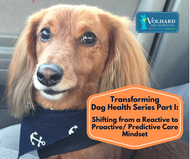Transforming Dog Health Series Part I: Shifting from a Reactive to Proactive/ Predictive Care Mindset
Posted by Jennifer Carter on Mar 5th 2020
“Empowered pet owners + Proactive
vets = The best opportunity for abundant well being and vibrant health”
- Dr.
Karen Becker
We are going to try something new with our blog and do a 4 part series on dog wellness- a proactive approach to maintaining dog health. It will begin with a conversation about proactive thinking versus reactive thinking and how that mindset shift might help your dogs live a longer, healthier life. A proactive approach focuses on eliminating problems before they have a chance to appear and a reactive approach is based on responding to events after they have happened. The difference between these two approaches is the perspective each one provides in assessing actions and events.
We spoke with Dr. Laurie Coger, who is an integrative and proactive veterinarian from Albany NY about this subject and she offered insight on what it takes to shift from a reactive mindset to a proactive/predictive dog healthcare model. Dr. Coger explains that it only takes a few changes to get you thinking proactively. Here are a few changes to think about:
1.) Changing your mind about only using medicine to manage your dog’s issues to getting your dog out and exercising them while using nutrition to manage their health.
2.) Working with your veterinarian on changing a one size fits all mentality to one that is personalized for your dog.
3.) Considering a switch from a veterinarian that is corporate-oriented to a vet in a privately owned practice with minimal corporate influences.
4.) Consider working with a veterinarian that is value-based versus volume-based.
In the world of pet care, vet services can usually be broken down into one of two different categories – proactive and reactive. For example, giving your dog a pill is considered a reactive measure, as you are reacting to a problem once the symptom has appeared. On the other hand, doing things like brushing your dog’s teeth are proactive measures because you are preventing cavities and other oral problems before they appear. Trying to understand the differences between the two can undoubtedly be confusing to some.
Unfortunately, too many people have the mindset that they should only see their vet if their dog is sick or at least until they notice an obvious negative sign. They assume that everything is okay if their dogs are able to go about their daily activities without any issues. When a health issue or problem occurs, that’s when they will take their dog to see a vet or specialist. However, this type of mentality is like playing Russian roulette simply because you don’t know what’s going on inside your dog’s body at any given time.

How do you want to spend your money?
Every year, Americans pay billions of dollars for veterinary care for our dogs with the majority of those costs being spent on reactive care versus proactive carevisits that keep our dogs healthy. Reactive care visits usually consist of a panicked rush to the vet where costs are higher in the effort to return your dog to a state of health once symptoms have shown themselves. We will always need reactive care to some degree because even the best plan sometimes goes awry, however, what if we were to start our dogs out with a proactive mindset prolonging the need for reactive medicine and striving for health through prevention?
What is the difference?
Proactive, preventive care is when you actively take charge of your dog’s health instead of waiting for symptoms to appear. The foundation you lay today is the one the dog thrives on later in life. The pet parent with a proactive mindset focuses on their dog’s diet, environment, exercise, and takes their dogs for veterinary wellness exams to keep sickness and unnecessary injury at bay.
We cannot forget that as a pet parent, we are in charge of our pet’s wellbeing:
● What goes into our dog’s mouth
● How much our dog moves
● The number of vaccines given and when
● The physical and emotional environment that surrounds our dog
● What vet(s) we choose to partner with
What do you mean- predictive care?
Today’s veterinarians face increasing pressure
to achieve better care coordination and improve patient care outcomes. To
accomplish these results, some veterinarians are turning to predictive
analytics. Genetic health testing might be one way to get ahead of issues by
understanding the risks that a certain breed might be predisposed to. Knowing
that information, allows the veterinarian to suggest environments, diet,
exercises that would keep the trigger for that disease from expressing for as
long as possible. We will talk more about these types of tests later in this
series.
So you can see that it is not very hard to think proactively, but we must constantly practice the skill. Sometimes with the stress of daily life we all fall victim to a reactive approach to care. Being able to notice that we have slipped into that mode will help us break out of that mindset and once again get proactive! In the next part of the Transforming Dog Health Series, we will present ways to figure out if your vet is a proactive or reactive thinker.


